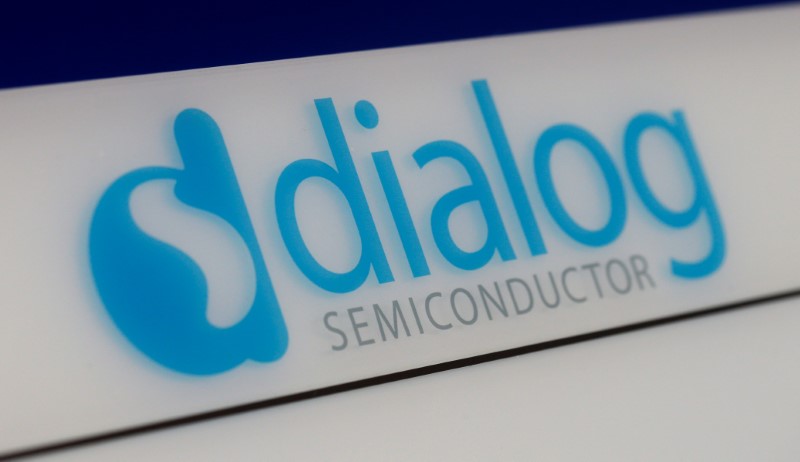By Eric Auchard and Harro Ten Wolde
FRANKFURT (Reuters) - Dialog Semiconductor (DE:DLGS) risks losing a crucial supply deal with Apple Inc (O:AAPL), according to a financial analyst who cut his rating on the stock on Tuesday, sending the Anglo-German chipmaker's shares down by as much as one-third.
Bankhaus Lampe reduced its rating on Dialog to "sell" from "hold" as it argued that Apple was working on its own battery-saving chip for the iPhone that could replace Dialog's power management integrated circuits (PMIC) as early as 2019.
Apple accounted for more than 70 percent of Dialog's 2016 sales, analysts estimate. The German company says it is the world's top maker of power management chips used in smartphones with roughly 20 percent of the market.
Shares in Dialog fell as much as 36 percent on Tuesday to a seven-month low. They had more than doubled in the second half of 2016 on rising expectations for the iPhone 8 due out later in 2017.
Dialog said it saw no business reason for the share drop and that it remained comfortable with its financial outlook for "good revenue growth" in 2017, which would mark a recovery from a 12-percent decline last year.
"The company notes the level of visibility into the design cycle of its leading customers remains unchanged and the business relationships are in line with the normal course of business," it said in a statement.
By 1340 GMT, the Dialog shares had pared losses and were 15 percent lower at 40.49 euros ($42.97).
Apple's suppliers are in the spotlight after Imagination Technologies (L:IMG) last week revealed Apple's plans to replace its graphics chips with parts it is developing in-house, sending shudders through Apple's global supply chain.
Imagination's stock plunged 70 percent.
Bankhaus Lampe cited unnamed industry sources as saying that Apple was setting up power management design centers both in Munich and California and said Apple already had around 80 engineers working on a power management chip of its own.
"In our view, there is strong evidence that Apple is developing its own PMIC and intends to replace the chip made by Dialog at least in part," Bankhaus Lampe analyst Karsten Iltgen said, referring to power management chips.
Lampe's Iltgen is a four-star rated analyst for the accuracy of his earnings estimates on Dialog and ranks sixth among 16 analysts covering the stock, according to Thomson Reuters data.
A source familiar with the matter confirmed that Apple was recruiting top Dialog engineers in Munich. "They are poaching like crazy," the person said.
Apple declines to comment on matters involving its supplier relationships and did not respond to a request for comment for this story.
A trader with brokerage Exane, who said he had been in contact with Dialog management, said investors were overreacting to speculation that Dialog might lose Apple's business.
He said Dialog has completed designs for chips that Apple plans to use in 2017 and 2018 iPhone models while it continues to discuss with Apple using its parts in 2019 phones.
The trader also said Apple would need to hire more than 1,000 engineers to completely replace the power management chips supplied by Dialog.
HIGHLY DEPENDENT
The downside of having Apple as a customer is that smaller suppliers can become dependent on its business due to the huge sales volumes generated by new iPhone contracts.
Dialog has made several attempts to diversify beyond Apple and other smartphone customers in the past few years.
In 2014, merger talks between Dialog and Austrian sensor chip maker Ams AG (S:AMS) fell apart after they failed to come to terms. Its plans to buy U.S.-based Atmel in 2015 were derailed after Microchip (O:MCHP) swooped in with a higher bid.
Apple has outsourced production of its hardware products to an extended network of suppliers, large and small, while it has moved over the past decade to design its own central processors and added functions like fingerprint recognition since then.
Over the past dozen years, Apple suppliers CSR, PortalPlayer, Sigmatel and Wolfson have been replaced, pushing them eventually to merge with more diversified players.
But Apple still relies on key suppliers to develop innovations ranging from image and motion sensors to power management.
Other chip suppliers for the current iPhone 7 include, but are not limited to, Cirrus Logic (O:CRUS), NXP (O:NXPI), Qualcomm (O:QCOM), Skyworks (O:SWKS), STMicroelectronics (PA:STM), according to an analysis by TechInsights in September.

Shares in highly diversified chipmaker STMicro, which analysts believe supplies light sensors for iPhones, fell 3.6 percent, weighing on the benchmark STOXX Europe 600 Technology (SX8P) index, which was down 1.5 percent.